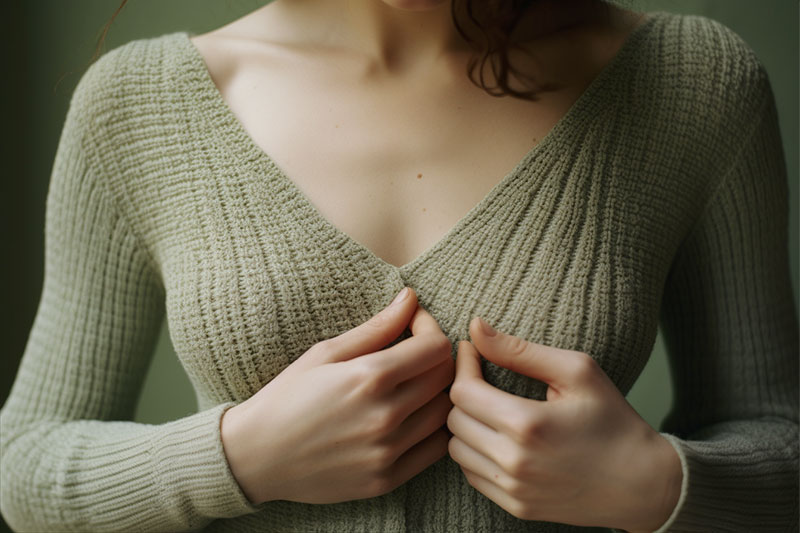Understanding the Subtle Signs: Itchiness as a Potential Indicator of Breast Cancer

Have you ever considered that an itch, often dismissed as a trivial annoyance, could be a whispering red flag for something more serious? Imagine your skin as a meticulous sentinel, offering clues in its persistent itchiness that might point to underlying conditions like breast cancer. While breast cancer is commonly associated with lumps and visible changes in breast tissue, it’s crucial to heed all the subtle signals our bodies send us. In this article, we’ll explore why an unrelenting itch in the breast area should not be taken lightly and how it could be a critical indicator of breast cancer.
When it comes to protecting our health, staying vigilant about the slightest changes is key. Think of your body as a complex network sending constant feedback; shouldn’t we pay close attention when something seems amiss? Persistent itchiness, particularly around the breast, can be a symptom of the rare but aggressive form of cancer known as Inflammatory Breast Cancer (IBC). This article aims to peel back the layers of this symptom, offering insights into its connection with breast cancer and guiding you through the nuances of when to seek medical advice. So, let’s dive into understanding the complexity behind that itch – it could be more than just skin deep.
The Itch You Shouldn’t Scratch Off Your List of Concerns
When we encounter an itch, our first instinct is to scratch. But what if that itch is your body’s way of signaling a deeper issue? Isn’t it worth exploring further, especially when your life could depend on it?
What Makes an Itch Suspicious?
It’s not every itch that should send you running to the doctor. But how do you differentiate between a run-of-the-mill itch and one that warrants a closer look? Consider these factors:
- Persistence: An itch that sticks around longer than usual, despite home remedies or over-the-counter treatments, deserves attention.
- Location: If the itch is localized to one breast or is accompanied by swelling or skin changes, take note.
- Surface Changes: Look for skin that appears orange-peel-like, reddened, or with unusual warmth. These could be signs of IBC.
Scratching Below the Surface: What Could an Itch Indicate?
Inflammatory Breast Cancer is not the only concern. Other conditions such as eczema, dermatitis, or even allergic reactions can cause similar symptoms. However, the distinguishing factor with IBC is the rapid progression of symptoms. It’s essential to be aware that IBC does not always present with a lump, making vigilance towards other changes all the more important.
When to Raise the Alarm: Seeking Medical Advice
So, when exactly should you consult a healthcare professional? If you’re experiencing persistent itching that doesn’t resolve with usual care, especially if it’s accompanied by the aforementioned skin changes, make an appointment. Early detection of breast cancer can significantly improve outcomes, and it’s always better to be safe than sorry.
Medical Evaluations and Tests: What to Expect
Upon visiting your doctor, you can expect a physical examination followed by diagnostic tests if necessary. These may include a mammogram, ultrasound, or even a biopsy to determine the nature of the problem.
Preventive Measures and Awareness: Staying One Step Ahead
While we can’t always prevent cancer, we can certainly stay informed and proactive. Regular self-examinations and being attuned to changes in your body are key. Additionally, maintaining a healthy lifestyle with a balanced diet and regular exercise can contribute to overall well-being and potentially reduce cancer risk.
Lifestyle Choices: Can They Make a Difference?
Absolutely. While genetics play a role in cancer risk, lifestyle choices such as limiting alcohol consumption, avoiding smoking, and controlling body weight can influence your risk profile. It’s about making choices today that could protect you tomorrow.
Empowerment Through Education: Understanding Your Body
Knowledge is power, and understanding the potential meaning behind symptoms like itchiness empowers you to take charge of your health. It’s about listening to your body’s whispers before they turn into screams.
Support and Resources: You’re Not Alone
If you’re concerned about breast cancer symptoms, remember that support networks and resources are available. Organizations like the American Cancer Society offer valuable information and support for those affected by breast cancer.
Conclusion: Heeding the Itch as a Health Messenger
Itchiness in the breast area could indeed be a red flag sign of breast cancer. By staying informed and attentive to your body’s signals, you can take timely action should any concerns arise. Remember, your health is in your hands, and sometimes, it’s the smallest signs that speak the loudest.
Are You Listening to Your Body’s Signals?
Now that you’re aware of the potential significance of an itchy breast, will you listen more closely to what your body is trying to tell you? It’s not just about responding to discomfort; it’s about recognizing the messages your body sends and acting on them with wisdom and promptness.
Remember, early detection saves lives, and your vigilance could be your very own lifesaver.



